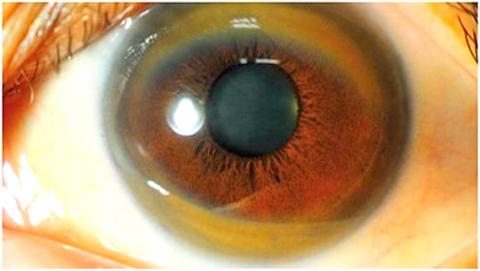A 26-year-old woman has been diagnosed with Wilson’s disease, which could lead to brain and liver dysfunction, and even death if left untreated, a Hsinchu doctor said on Tuesday last week.
Wilson’s disease is a rare genetic disorder in which copper builds up in the body, said Lee Cheng-hsuan (李承軒), a neurologist at National Taiwan University Hospital’s Hsinchu branch.
It has a prevalence of about one per 30,000 individuals worldwide, but the rate is higher in Asia, Lee said.

Photo courtesy of National Taiwan University Hospital’s Hsinchu branch
The patient, who requested anonymity, experienced shaking hands and difficulty walking to the extent that she had to lean on walls to walk, Lee added.
Clinical examinations showed that she had neurological problems, such as muscle stiffness and slow motor function, as well as brown discoloration in the eyes (Kayser-Fleischer rings), which are common signs and symptoms of Wilson’s disease, he said.
Blood and urine tests, and brain and liver screenings confirmed that she had the disease, he added.
Other common symptoms include dystonic postures, muscle rigidity, difficulty swallowing, difficulty speaking and poor articulation (dysarthria), lack of coordination, and changes in personality and behavior, Lee said.
As copper accumulates in the body, particularly in the brain and the liver, people with Wilson’s disease could develop cirrhosis at a young age and exhibit neurological symptoms in their 20s or 30s, he said.
It is a recessive genetic disorder, meaning parents of the individual with the abnormal gene do not usually exhibit symptoms, Lee said.
The woman’s 23-year-old brother has also been diagnosed with the disease, he said.
Unlike most other genetic disorders, Wilson’s disease can be treated by medication, which helps remove the excess copper from the body, Lee said, adding that people with the disease should follow a low-copper diet to prevent the condition from worsening.
People with Wilson’s disease need to take medication throughout their lives, but early diagnosis and treatment would drastically improve their life quality, as the disease is progressive, and delaying treatment could result in fatal brain or liver complications, he said.

Civil society groups yesterday protested outside the Legislative Yuan, decrying Chinese Nationalist Party (KMT) efforts to pass three major bills that they said would seriously harm Taiwan’s democracy, and called to oust KMT caucus whip Fu Kun-chi (傅?萁). It was the second night of the three-day “Bluebird wintertime action” protests in Taipei, with organizers announcing that 8,000 people attended. Organized by Taiwan Citizen Front, the Economic Democracy Union (EDU) and a coalition of civil groups, about 6,000 people began a demonstration in front of KMT party headquarters in Taipei on Wednesday, organizers said. For the third day, the organizers asked people to assemble

Taipei is participating in Osaka’s Festival of Lights this year, with a 3m-tall bubble tea light installation symbolizing Taiwan’s bubble tea culture. The installation is designed as a bubble tea cup and features illustrations of Taipei’s iconic landmarks, such as Taipei 101, the Red House and North Gate, as well as soup dumplings and the matchmaking deity the Old Man Under the Moon (月下老人), affectionately known as Yue Lao (月老). Taipei and Osaka have collaborated closely on tourism and culture since Taipei first participated in the festival in 2018, the Taipei City Department of Information and Tourism said. In February, Osaka represented

POOR IMPLEMENTATION: Teachers welcomed the suspension, saying that the scheme disrupted school schedules, quality of learning and the milk market A policy to offer free milk to all school-age children nationwide is to be suspended next year due to multiple problems arising from implementation of the policy, the Executive Yuan announced yesterday. The policy was designed to increase the calcium intake of school-age children in Taiwan by drinking milk, as more than 80 percent drink less than 240ml per day. The recommended amount is 480ml. It was also implemented to help Taiwanese dairy farmers counter competition from fresh milk produced in New Zealand, which is to be imported to Taiwan tariff-free next year when the Agreement Between New Zealand and

Taiwanese professional baseball should update sports stadiums and boost engagement to enhance fans’ experience, Chinese Professional Baseball League (CPBL) commissioner Tsai Chi-chang (蔡其昌) told the Liberty Times (sister paper of the Taipei Times) in an interview on Friday. The league has urged Farglory Group and the Taipei City Government to improve the Taipei Dome’s outdated equipment, including relatively rudimentary television and sound systems, and poor technology, he said. The Tokyo Dome has markedly better television and sound systems, despite being 30 years old, because its managers continually upgraded its equipment, Tsai said. In contrast, the Taipei Dome lacked even a room for referees